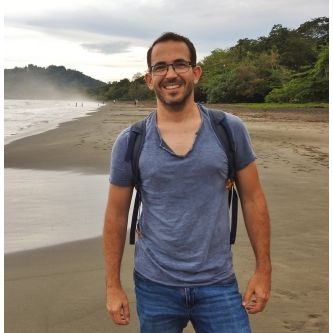
Latest publications
- 2022 Oecologia 199: 79-90 Sexual differences in phenotypical predictors of floating status: body condition influences male but not female reproductive status in a wild passerine
- 2021 European Journal of Wildlife Research 67:68. Influence of growing up in the city or near an airport on the physiological stress of tree sparrow nestlings (Passer montanus)
- 2021 Diversity, 13, 111 Prevalence and diversity of avian haemosporidians may vary with anthropogenic disturbance in tropical habitats in Myanmar.
- 2021 Behavioral Ecology and Sociobiology 75: 52 Prenatal manipulation of yolk androgen levels does not affect egg coloration or size in a songbird.
- 2021 Journal of Comparative Physiology B 191:195-206 Ontogeny of leukocyte profiles in a wild altricial passerine
- 2020 Behavioral Ecology and Sociobiology 73: 160. Age-related patterns of yolk androgen deposition consistent with adaptive brood reduction in spotless starlings
- 2020 Ecosistemas 29(2):1979 Evaluación ecofisiológica de las infecciones por hemosporidios sanguíneos en aves
- 2019 Behavioral Ecology and Sociobiology 73: 160 Age-related patterns of yolk androgen deposition are consistent with adaptive brood reduction in spotless starlings
- 2019 Sociobiology 66(3): 523-526 Nest association between Camponotus fallax (Hymenoptera: Formicidae) and Vespa crabro (Hymenoptera: Vespidae) in Central Iberian Peninsula.
- 2019 Journal of Evolutionary Biology 32(1): 111-125 Harsh conditions during early development influence telomere length in an altricial passerine: links with oxidative stress and corticosteroids.
Jaime Muriel
Postdoctoral researcher (IREC, UCLM)
Research Themes
In my research, I adopt an integrative approach to advance our understanding of eco-evolutionary processes in natural populations. I do this by applying ideas and techniques from complementary fields, such as evolutionary ecology, ecophysiology, and parasitology.
During the last few years, my publications have emphasized the importance of hormone-mediated maternal effects on individual phenotypic plasticity, supporting the role of maternally derived androgens as modulators of life-history trade-offs experienced by offspring. This knowledge is essential since maternal effects can potentially affect health status but also ecological and evolutionary processes, improving the adaptation of offspring to variable environments.
Curriculum Vitae
Bachelor's degree in Biology from the Complutense University of Madrid (UCM) in 2006. In 2007, I conducted my degree dissertation in avian parasitology directed by Dr. Javier Pérez-Tris in the Department of Zoology and Physical Anthropology at the UCM, obtaining the highest rate in June 2008. That same year I obtained a 6-month fellowship in the Department of Ecology at the UCO, under the supervision of Prof. Juan Fernández-Haeger. I finished the official Master's degree in Conservation Biology in 2009, and that same year I started my Ph.D. in Evolutionary Biology within the Official Postgraduate Program in Biology (UCM) thanks to an FPI fellowship, which was directed by Dr. Diego Gil and Dr. Lorenzo Pérez-Rodríguez at the National Museum of Natural Sciences (MNCN, Spain). I presented my thesis for defense in January 2016, obtaining the highest rate. I have published 24 SCI-indexed papers (316 citations and h-index=10) and publicized my research in 22 communications at national or international congresses. I have participated in 11 funded projects and been awarded 5 fellowships. During my stay at the MNCN, I have carried out several international and national collaborations and I had three contracts as a research assistant (2014, 2017, and 2018). After spending a few months in the UK (2016), I worked as a postdoctoral researcher in the Department of Evolutionary Ecology at the MNCN-CSIC (2017-2018). Between May 2018 and September 2019, I held a postdoctoral contract associated with Alfonso Marzal's lab at the University of Extremadura to investigate the evolutionary ecology of avian malaria. I subsequently joined Jesús Martínez-Padilla's team (Sep. 2019-Oct. 2021) as a Juan de la Cierva-Formación postdoc researcher at the Pyrenean Institute of Ecology (CSIC) to investigate how environmental conditions influence the evolutionary dynamics of phenotypes in wild birds. I had to leave this position in October 2021 to join the Department of Zoology at the University of Granada as a teaching assistant to teach Ethology and Zoology for the next 6 months. I have recently obtained a postdoctoral researcher contract for scientific excellence at the Institute for Game and Wildlife Research (CSIC) under the Plan Propio de I+D+i of the UCLM. In this project, we will investigate the effects of two of the main families of yolk compounds (androgens and antioxidants) on key aspects of offspring performance and physiological traits. My main line of research has been maternal effects followed by ecophysiology, host-parasite interactions, and habitat selection (particularly in avian models).
Regarding teaching activity, I have actively participated in the design, execution, and follow-up of six Master's Theses (3 students from the UEx, 2 students from the UCM, and 1 from Université de Lyon/Saint-Etienne (France)) and six End of course projects (6 students from the UEx). I have participated as co-director of the Doctoral Thesis entitled "Effects and consequences of host-haemoparasite interactions in amphibians and reptiles", defended by Dr. Manuel González Blázquez at the University of Extremadura in July 2021. I also have the Certificate of Pedagogical Aptitude (CAP) from the School of Educational Sciences (UCM), and I have given talks in training courses, highlighting my high involvement in the MuEuCAP training program in Myanmar (EU Erasmus+ project).
I have obtained the Professor's accreditation (Assistant Professor) by National Agency for Quality Assessment and Accreditation (ANECA) in October 2017, and the certificate of training course in laboratory animal science for scientists responsible for the design or conduct of animal experiments (Functions A, B, C, and D) by the UEx in 2019-2020. I have also participated in courses, seminars, and conferences, as well as in many bird-ringing campaigns. Additionally, I have participated as a reviewer of 25 scientific manuscripts in Science Citation Index (SCI) journals.



